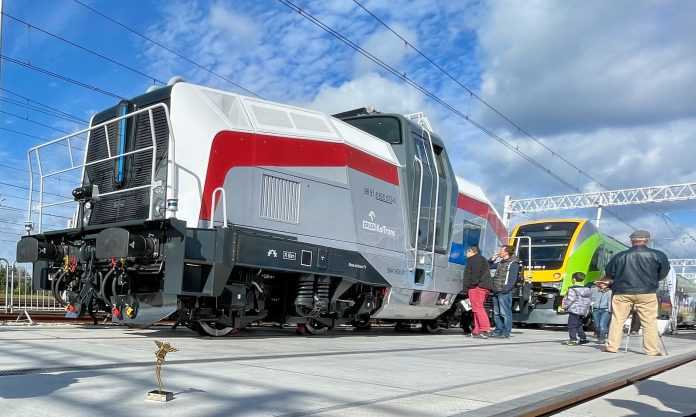Pesa – Poland’s largest rolling stock manufacturer – has introduced the first certified hydrogen shunting locomotive to be approved for the European market.

Hydrogen shunting locomotive with passed tests
The ability to offer a commercially ready vehicle with a mobile refuelling infrastructure was a key criterion in Pesa’s development approach. The SM42-6Dn locomotive passed preliminary operational tests at Pesa’s facility in Bydgoszcz, Poland, in August 2022, before being unveiled alongside a mobile refuelling station at InnoTrans a month later.
Railway Institute certification tests were completed in December, ahead of anticipated final approval in the first half of 2023. The 70t locomotive is focused on shunting and driving light freight trains, with a maximum speed of 90 km/h at an ambient temperature of -25°C to +35°C. The model is a hydrogen-based upgrade of Pesa’s SM42 class of shunting locomotives and represents the first phase of the company’s programme to implement zero-emission technologies in rail vehicles.
Pesa aims to use the experience gained from this project to inform its construction of a hydrogen-powered passenger train – with an initial prototype scheduled for 2025. Pesa’s locomotive is powered by two robust 85 kW proton exchange membrane (PEM) modules from Ballard – proven in heavy-duty zero-emission engine applications. The hydrogen-powered unit offers a low-risk, versatile and easy-to-install solution for system integrators, providing the route flexibility, range and maximum speeds demanded by industry operators. “Hydrogen technologies in rail transport are constantly developing and maturing, and Pesa’s continued deployment of zero-emission rail vehicles confirms our competence, expertise and level of innovation – and sets us apart as a leader in this space. Our ambition to accelerate industry-wide decarbonisation is shared by Ballard, whose robust fuel cell platform provides a durable, high-performance power module for the heavy-duty SM42-6Dn application – making Polish railways a significant step closer to a clean, comfortable and environmentally friendly future,” Maciej GrześkowiakDirector of Strategic Projects and Communications, Pesa, said.
Ballard’s modular fuel cell design allows for flexible integration of components into the vehicle’s propulsion system, provides better performance, fuel efficiency and endurance by preventing fuel cell unit degradation, and Ballard’s proven performance and reliability is demonstrated by the module’s exceptional availability and lifetime – well over 30,000 hours of fuel cell operation in the field without failure.
Oben Uluc, Sales and Commercial Director, EMEA, Ballard, said, “Ballard customers understand the importance of adopting zero-emission energy to keep pace with the industry, as well as identifying key collaborators to work with (…) The supply of our robust and durable fuel cell module to PESA’s hydrogen locomotive demonstrates Ballard’s proven market experience, our performance in delivering pioneering vehicle fuel cell energy and the promise of comprehensive customer support for mission-critical solutions.”
Final type approval testing was completed after a special mobile hydrogen refuelling station was built in partnership with PESA’s fuel and energy collaborator, PKN ORLEN, on an experimental line in Płock, Poland, to ensure that all dynamic tests could be carried out efficiently.
Pesa and PKN ORLEN plan to commission the zero-emission SM42-6Dn locomotive in the first quarter of 2023 and have signed a collaboration agreement that will allow the locomotive and power station to be offered as a package.
Share on:



